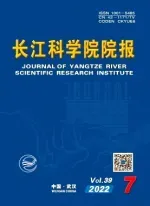Health Assessment of Yellow River Delta Wetland
GUO Bin,JIANG Chun-bo,YANG Chen(State Key Laboratory of Hydroscience and Engineering,Tsinghua University,Beijing 100084,China)
Health Assessment of Yellow River Delta Wetland
GUO Bin,JIANG Chun-bo,YANG Chen
(State Key Laboratory of Hydroscience and Engineering,Tsinghua University,Beijing 100084,China)
Health assessments ofwetlands aim at judgingwetland health conditions and tendency to develop and implement management strategies and restorationmeasures efficiently.This study established a new index system and made health as-sessments of Yellow River Delta wetland with themethod of fuzzy comprehensive assessment.The results show that Yellow River Delta wetland was generally sub-healthy during 1992 to 2008.Besides,economy assessments of Dongying were con-ducted every year in the same period,the results indicated that the fast economic development have generated negative effect on wetland health.Themain influence respects are the reduction of incoming water and sediment,the wetland resto-ration projects and the fast economic development of Dongying.
health assessment;Yellow River Delta wetland;fuzzy comprehensive assessment;index system;economy as-sessment
1 INTRODUCTION
Wetland is an unique ecosystem located in aquat-ic-terrestrial ecotope.It is one of the most productive ecosystems with high biodiversity in the world.Wet-lands have not only various ecological and environmen-tal functions such as flood control,water purification and biological diversity maintenance,but also social and economic functions.However,they are more and more threatened by human activities,along with de-creasing area and weakening functions[1].
Health assessments of wetlands,a hot issue in wetland research and management,aim at judgingwet-land health conditions and tendency in order to develop and implement management strategies and restoration measures efficiently[2].A number of index systems were established for the purpose of wetland health as-sessment,and indicators of ecological functions and ecological features aremost used.Scardi et al.[3]and Yeom etal.[4]set up single-indicator systemswith fish as the indicator species;Spencer et al.[5]built an in-dex system for fast assessment considering soil,edge plants,aquatic plants and water quality;Breaux et al.[6]took wild animals,dominant species,habitat condition,hydrology and land use as five features in wetland ecological and compliant assessments in the San Francisco Bay Region,California,USA.In recent years,as human activities play an increasingly impor-tant role in wetlands,social and economic indicators are added to the index systems.Rapport et al.[7]put forward an index system containing biological indica-tors,physical indicators and social and economic indi-cators for wetland ecosystem health assessment;Cui B and Yang Z also constructed a comprehensive index system with ecological features,ecological functions and social indicators.
Although scholars havemademany wetland health assessments,most of them are only of a certain year or the average conditions of several years because of data insufficiency.In this study,a new index system for Yellow River Delta wetland is constructed by integra-ting the existing wetland health assessmentmodels and a large amount of data are collected and processed to provide assignments for every indicator.Health assess-ments of Yellow River Delta wetland are made of con-secutive years from 1992 to 2008,thus we can get acomprehensive grasp of thewetland health and track its changes.
2 METHODS AND MATERIALS
2.1 STUDY AREA
Yellow River Delta,famous for its rapid growth and bird diversity,is located in Dongying City,Shan-dong Province,China.In this study,Yellow River Delta is a fan-shaped depositing zone,with Ninghai as a vertex of reaching the mouth of Taoer River in the north and themouth of ZhimaiDitch in the south(Fig.1).The total land area is5 400 km2,ofwhich present 93%of the land area belongs to Dongying and 7%be-longs to Binzhou[9-11].Therefore,data about society and economy of Dongying are representative for Yellow River Delta wetland.
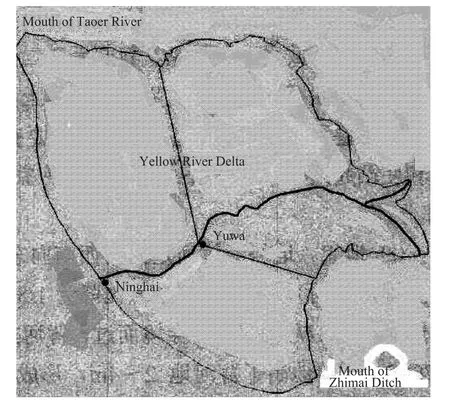
Fig.1 The scope of Yellow River Delta W etland
2.2 ASSESSMENT MODEL
2.2.1 HEALTH ASSESSMENTMODEL
This study applies fuzzy comprehensive assessment(FCA),a prevalent,effective and comprehensive as-sessmentmethod,to health assessment of Yellow River Delta wetland.The procedure to establish a FCA mod-el[12]is:①to choose indicators and set up an index system,②to determine indicator weights,③to clas-sify assessment levels,④to define fuzzy membership functions and figure out membership matrices,⑤to conduct fuzzy synthetic calculation and get the assess-ment result.Using FCA enables us to take various as-pects into account and make full use of information;it also integrates dozens of indicators into one final re- sult.This study introduces a FCA model for health as-sessment of Yellow River Delta wetland for a single year.
First of all,we establish a new two-level index system that reflects health condition of Yellow River Deltawetland[8-9,13-14].Ecological functions,ecologi-cal features and human society are listed on the first level.We choose 7,12 and 10 indicators,respective-ly,for three categories under consideration of compre-hensiveness,independence,specificity and feasibility.These 29 indicators on the second level are divided into two groups:quantitative indicators and qualitative indi-cators.According to experts and related literatures in this field,every category weight and indicator weight are determined,making sure that the sum of all indica-tor weights of each category is 1.The selected catego-ries and indicators with their weights are listed in Table 1.

Table 1 Index system of health assessment
From table 1,four weight vectors are defined as following:A=(0.34,0.38,0.28);A1=(0.15,0.15,0.16,0.12,0.17,0.15,0.10);A2=(0.12,0.11,0.09,0.09,0.06,0.06,0.09,0.11,0.08,0.06,0.07,0.06);A3=(0.07,0.08,0.13,0.15,0.08,0.08,0.09,0.14,0.09,0.09).
Wetland health is classified into four levels,namely excellent,healthy,sub-healthy and sick.The value of fuzzy membership of each indicator related to the four assessment levels can be calculated by a set of formulae and fuzzy membership matrix[9].After figu-ring out the membership matrices of the three catego-ries,we can get the final result by fuzzy synthetic cal-culation below:
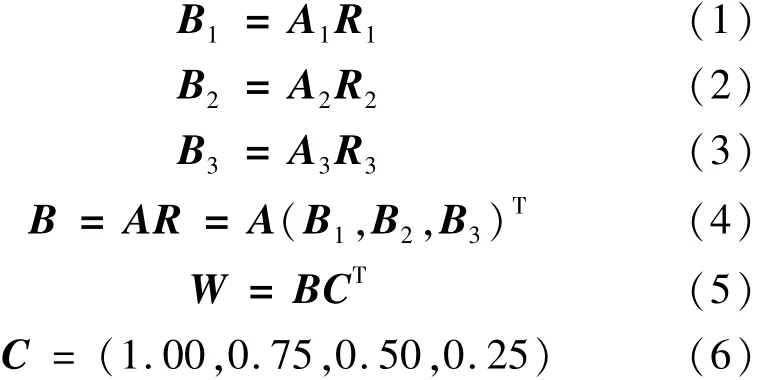
In which:
R1,R2and R3representmembershipmatrix of ec-ological functions,ecological features and human soci-ety,respectively;
C=(1.00,0.75,0.50,0.25)is the grade vector,in which the four numbers successively repre-sent excellent,healthy,sub-healthy and sick;
W represents the final assessment result.
Now the FCAmodel for a single year is completely established.Repeatedly using it with proper data will produce a series of health assessment results of Yellow River Delta wetland.
2.2.2 ECONOMY ASSESSMENTMODEL
An economy assessmentmodel for Dongying is al-so set up following the health assessmentmodel.Out-put value,residents living and foreign trade are the three categories,with weight of0.71,0.22 and 0.07.The indicators and their grading standards and weights are listed in Table 2.The rest parts of economy assess-mentmodel are the same with the health assessment model in 2.2.1.
2.3 DATA COLLECTION AND PROCESSING
Every indicator needs data of every year from 1992-2008 to figure out the assessment results.By literature research and field survey,a large amount of data are collected.The series of Dongying Statistical Yearbook[15]contain various data,most of which can cover 1992-2008.Some desired data are obtained by excerpting from the yearbooks and calculation.Some data are found in papers about Yellow River Delta,but they are usually only of certain years.These data series are not complete and need processing such as trend a-nalysis and curve fitting.Some data are assigned based on literature research and field survey.
Taking people’s health condition as an example,we use mortality to reflect people’s health condition and excerpt data from Dongying Statistical Yearbook(the round spotswith the legend of‘Original data’in Fig.2).The mortality of years from 1994 to 1999 is not available,sowe draw a fitting curve and adjust the curve type to find the optimal curve on the basis of R2.Using its expression we can easily calculate themortali-ty of every year from 1992 to 2008(the square spots with the legend of‘Fitting data’in Fig.2).Themor-tality series of 1992-2008 comes out by combining o-riginal data and fitting data.
In the end,all of the data form a 17×29 matrix.Each row can support health assessment of a certain year and each column shows the change of a certain in-dicator from 1992 to 2008.
3 RESULTS

Table 2 Economy assessment indicators,grading standards and weights
Health assessment results of Yellow River Delta wetland from 1992 to 2008 are shown in Fig.3.The interval of the 17 results is 0.53-0.65,which indi-cates that Yellow River Delta wetland was generally-sub-healthy from 1992 to 2008.The health condition almost remained unchanged from 1992 to 2001 and thevalues are around 0.55,close to 0.50 which means sub-healthy.The line goes up and down from 2001 to 2008,with two peaks in 2002 and 2005-2006.After 2006,the line declines from 0.65 to 0.60,itmeans that wetland health conditions were deteriorating in those years.In this health assessmentmodel,catego-ries of ecological functions and ecological features re-flect the ecological aspects of wetland,while human society category reflects interaction between human and wetland.If the category weight of human society is set as 0 and the other two category weights increase prop-erly,the assessment resultswill illustrate the ecological aspects of wetland.On the other hand,if the category weight of human society is set as 1 and the other two weights as 0,the assessment results will indicate the aspects of human society related to wetland.
Fig.4 shows three lines of assessment results and their trends are not completely conformed.The square spotswith‘Ecological categories only’as legend mat-ches the‘Health assessment’line well,which indi-cates ecological indicators as themajor factor of health assessment.On the contrary,the round spots with the legend of‘Human society only’highly undulate and deviate from the‘Health assessment’line,which shows instability of human society category and incon-formity with health assessment results.After the year 2000,environmental investigation index and wastewater treatment index are mainly responsible for this undulation.

Fig.2 Data collection and p rocessing ofmortality
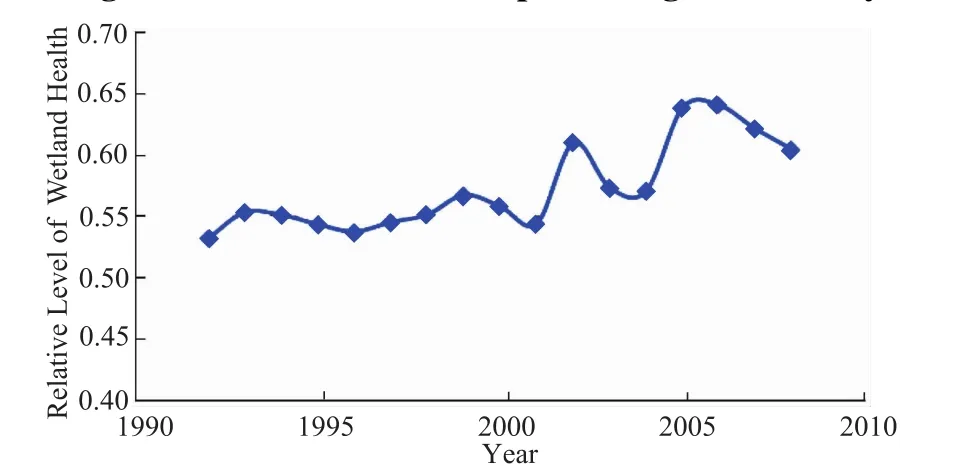
Fig.3 Health assessment results of Yellow River Delta wetland
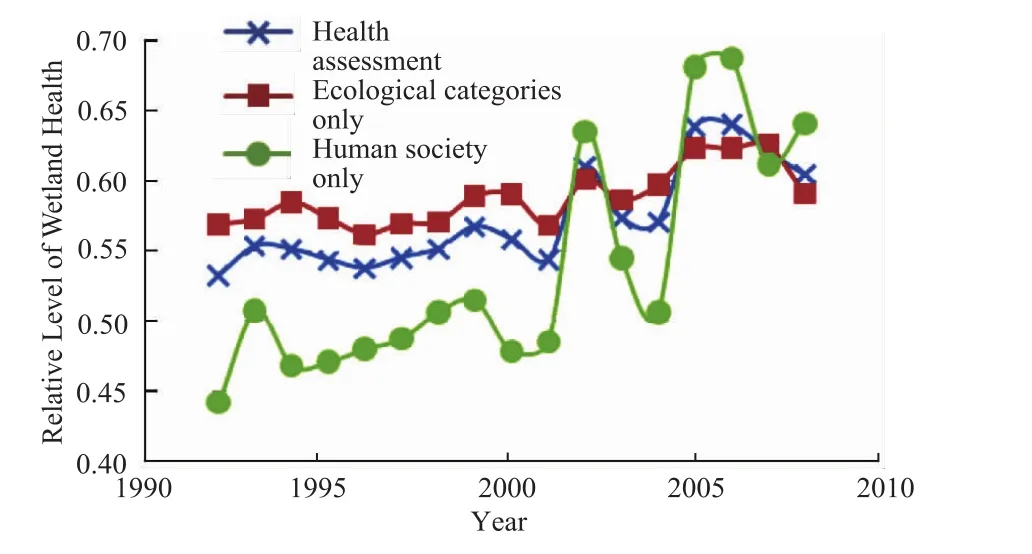
Fig.4 Results of three kinds of assessment
To find out the economy conditions of Yellow Riv-er Delta wetland,we make economy assessment of Dongying,where thewetland locates.The economy as-sessment results show that Dongying’s economy devel-oped relatively slow between 1992 and 2001,and the development speed became high since 2002(See Fig.5).

Fig.5 Economy assessment results
4 DISCUSSIONS
The incoming water and sediment of Yellow River Delta largely decreased in 1990s and the break-flow of Yellow River caused world-wide concern.The shortage of water and sediment caused coast erosion,sea water encroachment and land salinization,which made a great contribution to the deterioration of wetland ecolo-gy,leading to low health assessment results of 1990s.The occupation of wetland is also a big problem.Wet-land was on a large scale turned into farmland,petrole-um industrial land,city construction land,etc.The shrinkage of wetland area led to less space and worse environment for plants and animals,resulting in less biodiversity and lower productivity.Besides,overuse of wetland resources and environmental pollution brought by the rapid development of Dongying contrib-uted to the decline ofwetland health.
As people paid more attention to wetland ecosys-tem,the Yellow River Delta Nature Reservewas estab-lished in 1992 and the corresponding administrative bureau came into being existence at the same year.Fa-cing with the poor health condition of the wetland,the administrative bureau carried out a wetland restoration project in 2002,followed by another restoration project with larger area in 2006.This explains the improve-ment ofwetland health in 2002 and 2006.
From Fig.4 and Fig.5,we can see the inconsist-ence between wetland health and economy,this indi-cates that economic development was out of harmony with wetland reservation.Dongying is enjoying its fast economic development,but this development should not sacrifice the health of Yellow River Delta wetland.Although the government has taken measures such as legislating for wetland protection,constructing wetland restoration projects,publicizing wetland protection and carrying out researches,Yellow River Deltawetland re-mains sub-healthy and requiresmore effort to improve its ecological condition.
5 CONCLUSION
The fuzzy comprehensive assessment(FCA)model synthesizes various indicators of wetland health into a final result,thus has a wide coverage and makes full use of data.Based on the health assessments in this study,Yellow River Delta wetland kept sub-healthy from 1992 to 2008.Both natural conditions and human activities have influence on thewetland health.The re-duction of incoming water and sediment,the wetland restoration projects and the fast economic development of Dongying are the main influence factors.The eco-nomic development was out of harmony with wetland reservation,and more efforts are needed to improve the ecological condition of Yellow River Delta wetland.
Acknow ledgements
This work was supported by the National Basic Research and Development Programme Of China(No.2006CB403304),Tsinghua University Initiative Scien-tific Research Program(No.2009THZ 07060)and the State Key Laboratory of Hydroscience and Engineering of Tsinghua University(No.2009-TC-2)
REFERENCES:
[1] WILLIAMSM.Wetlands:A Threatened Landscape[M].Oxford:Blackwell Publishers,1993.
[2] OSTENDORP W,ISCLI C,KRAUSS M,et al.Lake shore deterioration,reed management and bank restoration in some central European lakes[J].Ecological Engineer-ing,1995,(5):51-75.
[3] SCARDIM,CATAUDELLA S,DATO PD,et al.An ex-pert system based on fish assemblages for evaluating the ecological quality of streams and rivers[J].Ecological In-formatics,2008,3(1):55-63.
[4] YEOM D H,ADAMS S M.Assessing effect s of stress across levels of biological organization using an aquatic e-cosystem health index[J].Ecotoxicology and Environmen-tal Safety,2007,67(2):286-295.
[5] SPENCER C,ROBERTSON I,CURITSA,et al.Devel-opment and testing of a rapid appraisal wetland condition index in south-eastern Australia[J].Journal of Environ-mental Management,1998,54(2):143-159.
[6] BREAUX A,COCHRANE S,EVENS J,et al.Wetland ecological and compliance assessments in the San Francisco Bay Region,California,USA[J].Journal of Environmen-tal Management,2005,74(3):217-237.
[7] RAPPORT D J,GAUDET C,KARR JR,et al.Evalua-ting landscape health:integrating social goals and biophys-ical process[J].Journal of Environmental Management,1998,53:1-15.
[8] CUIBao-shan,YANG Zhi-feng.Establishing an indicator system for ecosystem health evaluation on wetlandsⅡ.An application[J].Acta Ecological Sinica,2002,22(8):1231-1239.
[9] HAN Mei.Research on Wetland Ecology of the Yellow River Delta[M].Jinan:Shandong People’s Publishing House,2009.
[10]ZHANG Xiao-long.Study of environment changes and de-terioration of modern Yellow River Delta seaside wetland[D].Qingdao:Qingdao Ocean University,2005.
[11]MA Yan-yan.Environment changes ofmodern Yellow Riv-er Delta coastal zone[D].Qingdao:China Ocean Univer-sity,2008.
[12]LIBai-nian.Fuzzy Mathematics and Its Application[M].Hefei:Hefei University of Technology Press,2007.
[13]WANG Zhi-liang,WANG Guo-xiang.Health assessment index system of Hongze Lake wetland ecosystem[J].Chi-nese Journal of Eco-Agriculture,2007,15(6):153-155.
[14]YIN Lian-qing,HAN Zhong-ge,LONG Yuan.Health as-sessment on Hengshui Lake wetland ecosystem[J].Envi-ronmental Science and Management,2009,34(11):136-140.
[15]Dongying Statistical Bureau.Dongying Statistical Yearbook[M].Dongying:Dongying Statistical Bureau, 1993.
(Edited by LIU Yun-fei and YIXin-hua)
X171
A
1001-5485(2010)10-0044-06
date:2010-08-19
.GUO Bin(1987-),female,Weifang City of Shangdong Province,Undergraduate.Her interest is evironmental engineering.(Tel.)01-609-937-9924(E-mail)fullofenergy3@gmail.com
Corresponding author:IANGChun-bo(1960-),Male,ZhenlaiCounty of Jilin Province,Professor.Hismain interests are involved in hydraulicsand water environment.(Tel.)010-6277-1820(E-mail)jcb@mail.tsinghua.edu.cn

